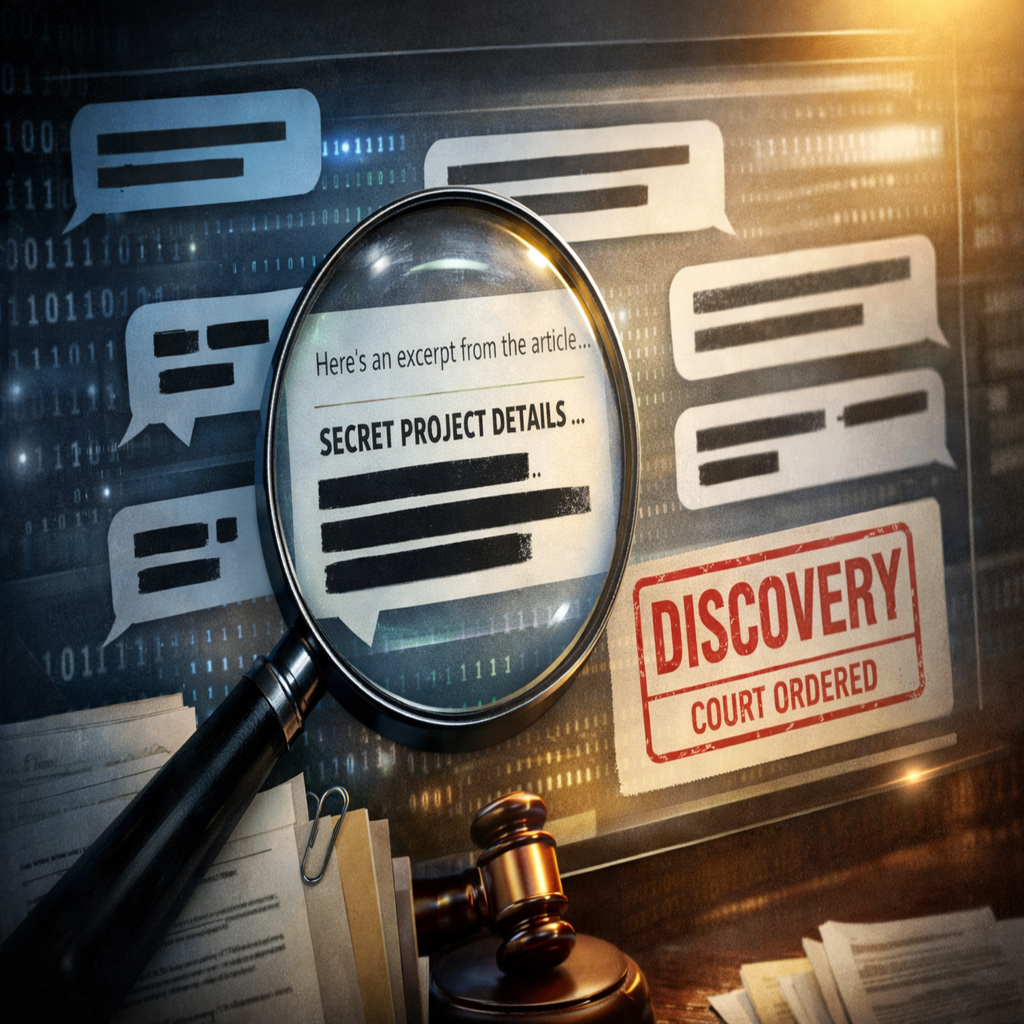Insights < BACK TO ALL INSIGHTS
Chatbots, Copyrights, and the Courts: The Latest in Litigation Developments in the Cases Against OpenAI
FEATURED
January 5, 2026
Chatbots, Copyrights, and the Courts: The Latest in Litigation Developments in the Cases Against OpenAI
By: Abbey Block
Litigation Update: Open AI’s Discovery Woes and Fair Use Defenses in Infringement Lawsuits Since its formation in 2015, the artificial intelligence company “Open AI” – most known for its creation of the widely used chatbot, “ChatGPT” – has faced its fair share of legal disputes. Two of the most notorious lawsuits, one filed by the New York Times and the other by a class of prominent fiction authors, are moving full steam ahead, illustrating the complex interplay of legal rights, litigation tools, and technological innovation. This blog post examines the most recent developments in the lawsuits, and considers what these developments mean for the parties, and the future of artificial intelligence more broadly. Judge Orders Open AI to Disclose Chat…
The Truth Will Out – Even About Mar-a-Lago
December 27, 2025
The Truth Will Out – Even About Mar-a-Lago
By: James Trusty
The Truth Will Out is a fairly obscure phrase that was popularized in Shakespeare’s “The Merchant of Venice.” It suggests that even against the most active obstruction and obfuscation, the Truth seemingly has an invisible hand behind it that relentlessly—if slowly—pushes it into plain view. Nearly 2 ½ years after the FBI’s raid on Mar-a-Lago, the Truth may be emerging into the daylight. August 8,…
White-Collar Sentencing Under the Amended Guidelines: Fewer Steps, Same Dance
November 12, 2025
White-Collar Sentencing Under the Amended Guidelines: Fewer Steps, Same Dance
By: Robert Ward
For years, the U.S. Sentencing Commission’s Guidelines Manual has guided courts through a three-step process to determine the sentence to be imposed. At a high level, that process looked like this: First, the court would calculate the guideline range based on relevant offense conduct and related factors, along with the defendant’s criminal history. Second, the court would consider the Sentencing Commission’s policy statements or commentary…
Where to Draw the Line With Undercover FBI Operations
November 13, 2014
Where to Draw the Line With Undercover FBI Operations
By: Nicole Kardell
Several news publications have been making much ado about a tactic the FBI used in 2007 to locate an individual suspected in a series of bomb-threats to Washington state high schools. The FBI created a fake news article, falsely representing it as an Associated Press publication, and sent a link to the suspect’s MySpace account. The article headline, which was directed at the suspect, was…
The Road to True Threats is Paved with Intimidating Intentions
September 24, 2014
The Road to True Threats is Paved with Intimidating Intentions
By: Jeffrey Hamlin
Recently, the Tenth Circuit Court of Appeals considered the dividing line between free speech guarantees and the state’s authority to criminalize threat speech. In United States v. Heineman, the court held that the government must prove specific intent in true-threat cases: to obtain a conviction, prosecutors must prove not just that the defendant intended to communicate a threat, but that he intended for the recipient…
A New Remedy for Online Defamation
September 12, 2014
A New Remedy for Online Defamation
By: Ifrah Law
In the United States it is enormously difficult to remove allegedly defamatory information from the internet. A victim can take the expensive and time-consuming step of suing the author for defamation in court. However, even if a court rules that the statement is defamatory—that is, that the published statement is false and harmful to the subject’s reputation—the victim’s remedy is usually monetary damages. U.S. courts…
More Money, More Problems – Another Billion Dollar Settlement for the DOJ
September 10, 2014
More Money, More Problems – Another Billion Dollar Settlement for the DOJ
By: Nicole Kardell
This summer BNP Paribas, one of the five largest banks in the world, agreed to a $9 billion settlement with the U.S. Department of Justice. The settlement figure may seem nothing short of economic shock and awe; indeed it was the largest criminal penalty in U.S. history. What could justify such a staggering fine and was the DoJ too heavy-handed in its tactics against the…
The Hidden Regulatory and Licensing Consequences to a Conviction or Arrest
September 8, 2014
The Hidden Regulatory and Licensing Consequences to a Conviction or Arrest
By: Steven Eichorn
When it comes to a conviction, or even an arrest, the collateral consequences that are sometimes overlooked by client and counsel can be extremely damaging, especially when dealing with government agencies and programs. One such set of consequences is unique to contractors who do business with federal or state governments. Because even a plea to a criminal conviction represents a person’s affirmative statement of the…





